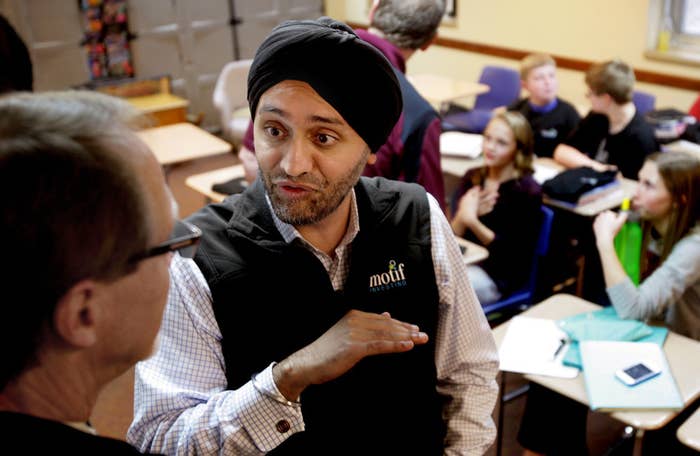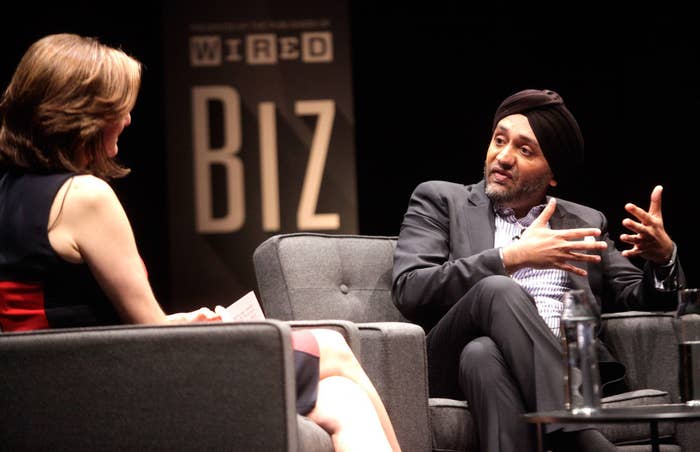
The online broker Motif Investing, which charges customers a $9.95 commission to buy in a "motif" of up to 30 stocks based around a theme, is now parterning with insurance giant Pacific Life to let investors buy stock in companies that support causes they care about.
The four motifs, as the company calls them, are a new take on what's known as "impact" or "socially responsible" investing. The four groups of stocks all have a cause associated with them — hunger, cancer, human rights, and poverty — and are made of stocks of companies that have made significant charitable donations in those areas. Investors can buy these products, or motifs, through Motif for the same $9.95 commission, at least a dollar of which will go to Pacific Life's subsidiary Swell. Pacific Life will also donate 20% of its revenues to a charity associated with each cause.
"We are creating a family of motifs that are cause-driven and aligned to people's values they," Motif's founder and CEO Hardeep Walia told BuzzFeed News in an interview. "They allow new investors, millennials, to invest in a transparent, low-cost way, give you return of the market, and designed to celebrate certain values that you might associate with."
Motif's new product is different from traditional socially responsible investors, like mutual funds that apply a "screen" to exclude companies from the fund's holdings, like tobacco companies, or institutions that "divest" and sell off their holdings in, for example, fossil fuel companies.
Motif and Pacific LIfe are letting customers invest in companies which make specific charitable committments. For example, the "Uphold Human Rights" Motif is one-third financial companies like Deutsche Bank, Goldman Sachs, Citi, and Bank of America. It also includes shares of Nike and casino operator Caesars Entertainment. The "End Poverty" motif includes holdings of oil giant ExxonMobil and Wal-Mart.
"Swell has reviewed the top companies publicly traded in the U.S. that are committed to supporting poverty-related charities," Swell and Motif say. "Swell then selects the top 30 donors to create a motif that aims to moving along with the S&P500 Index." Selecting companies by the dollar amount of their charitable donations naturally weights the "motifs" toward the largest companies.
The selections are not driven so much by what the company does — Bank of America and ExxonMobil are hardly Ben and Jerry's, let alone Starbucks or Whole Foods, which explicilty imbue a social purpose into their operations (for better or worse). Bank of America has had to pay tens of billions of fines and settlements to investors, law enforcement agencies, and regulators for its behavior and mortgage operations before and during the financial crisis. The bank has a 3.3% weight in all four of the products offered by Pacific Life and Motif.

There are already thousands of these baskets of stocks available to Motif customers created by other users of the service, like one constructed out of funds that bets against a rising oil price or one for the "hottest" biotechnology and pharamceutical stocks.
Walia says his company's products are like customizable exchange traded funds. "We want you to invest conceptually; I think therefore I invest," Walia says. "Whether you're a newbie investor or a trader, you should be able to express what you think."
It is not just companies whose CEOs are more likely to be seen wearing a fleece vest thn a tie that are diversifying their product mix in a bid to draw in new customers concerned with more than higher returns. Some large banks have started offering funds and products to investors that fund social services and then get paid out at a fixed rate based on how that service performs. According to a poll done by the SpectremGroup, about 57% of high-net-worth investors under 44 said social responsibility was "an important factor in investment selection," about twice that of older groups.
The move toward socially conscious investing, however, is in contrast with another trend: a huge shift into passive investing, where investors pile their money into mutual funds and exchange traded funds that reflect major indices like the S&P 500. Of the $167 billion that flowed into mutual funds, $114 billion went to passive funds, according to the Investment Company Institute. These investments are necessarily insensitive to what exact companies are included and don't offer investors any chance to reflect values besides conservatism and thrift.
While Motif talks a lot about winning over the next generation of investors and disrupting stock trading, they've also won the endorsements and checks of very mainstream and established financial institutions. Goldman Sachs and JPMorgan Chase are investors in Motif, while former Securities and Exchange Commission Chairman Arthur Levitt sits on the company's board. Motif has raised $126.5 million, according to the venture capital database Crunchbase, and recently closed a $40 million investment round led by the Chinese social networking company Renren.
"This next generation is different from other generations, they want to invest consistent with their our values and they care what they're invested in," Walia.
